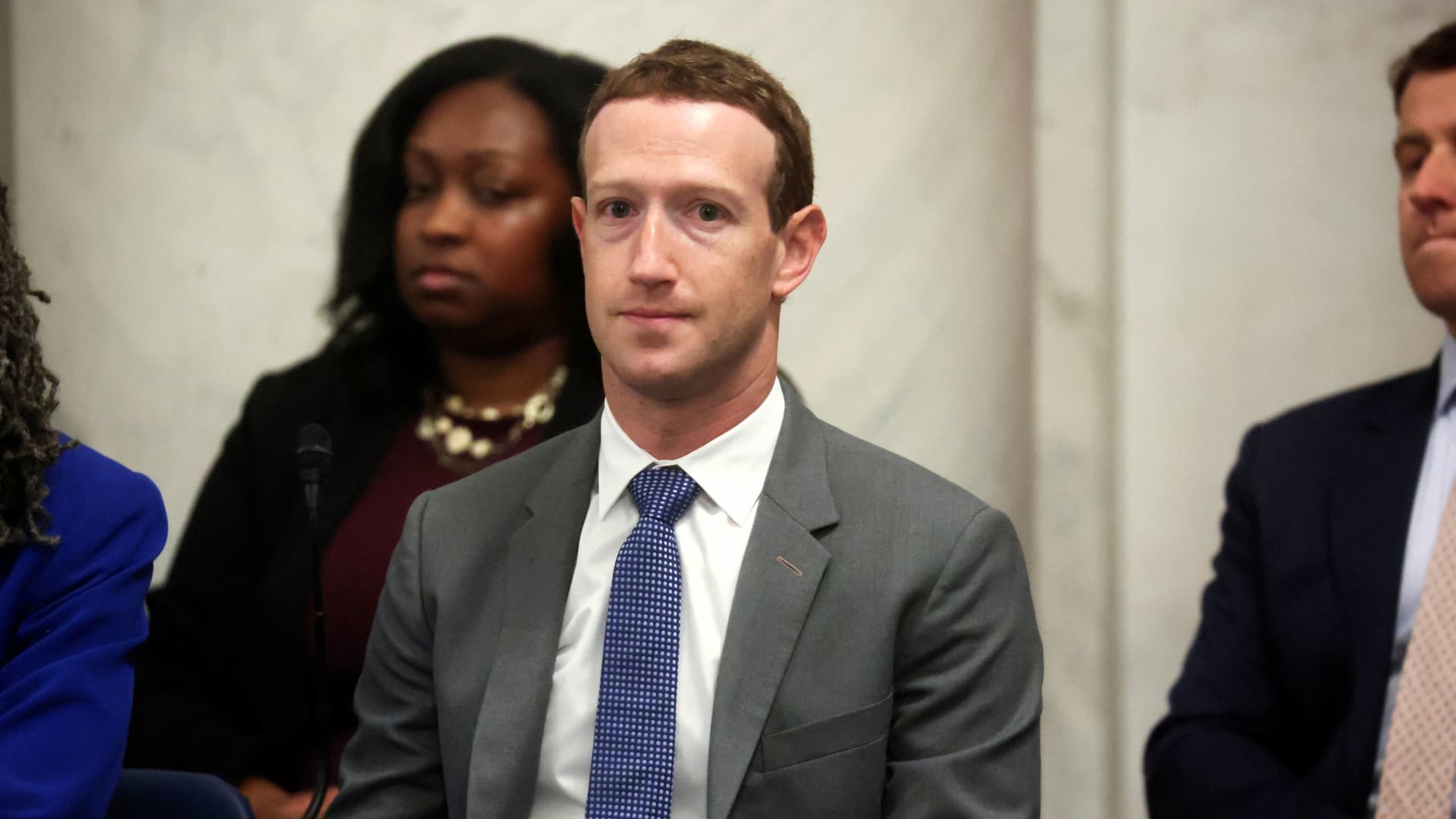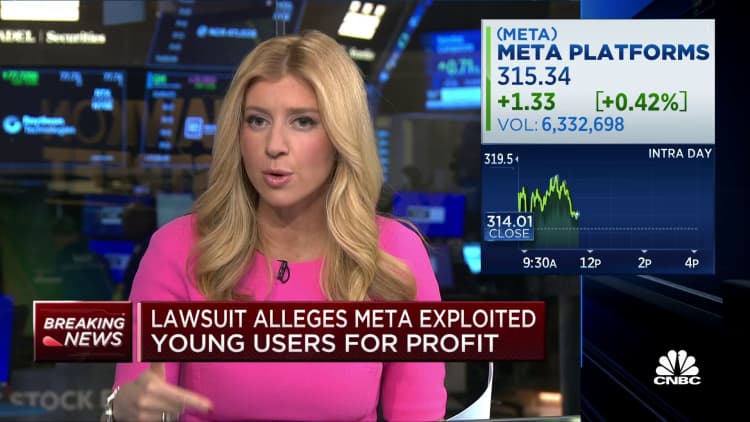

Facebook co-founder and Meta CEO Mark Zuckerberg sits in his seat inside a bipartisan Artificial Intelligence Insight Forum for all U.S. senators hosted by Senate Majority Leader Chuck Schumer at the U.S. Capitol in Washington, D.C., on Sept. 13, 2023.
Leah Millis | Reuters
While Republican and Democratic lawmakers appear more incapable than ever of working together to pass legislation, they largely agree on one thing: Meta’s negative impact on children and teens.
A bipartisan coalition of 33 attorneys general filed a joint federal lawsuit on Tuesday, accusing Faceboook‘s parent of knowingly implementing addictive features across its family of apps that have detrimental effects on children’s mental health and contribute to problems like teenage eating disorders.
Another nine attorneys general are also filing lawsuits in their respective states.
“Kids and teenagers are suffering from record levels of poor mental health and social media companies like Meta are to blame,” Attorney General Letitia James, a Democrat, said in a statement. “Meta has profited from children’s pain by intentionally designing its platforms with manipulative features that make children addicted to their platforms while lowering their self-esteem.
Meanwhile, Tennessee’s Republican Attorney General Jonathan Skrmetti noted that polarization in politics is unlike anything this country has seen “since the Civil War.” Yet Skrmetti is firmly in James’s camp when it comes to Meta.
“For all of the attorneys general from both parties, people who frequently disagree very vocally and very publicly, to all come together and to move in the same direction, I think that says something,” Skrmetti said at a press conference after the lawsuit was filed.
The political dysfunction is most acute right now in the House of Representatives, which has been without a Speaker for three weeks after a small band of eight hardline conservative Republicans joined all Democrats to approve a “motion to vacate” introduced by GOP Rep. Matt Gaetz of Florida.
California’s Kevin McCarthy, who was booted as speaker, angered some members of his party by working with Democrats to avoid a government shutdown, even though he bowed down to many of those same lawmakers in September in instructing Republican-led committees to open an impeachment inquiry into President Joe Biden.
U.S. Rep. Matt Gaetz (R-FL) sits with fellow lawmakers as the House of Representatives votes for the third time on whether to elevate Rep. Jim Jordan (R-OH) to Speaker of the House in the U.S. Capitol on October 20, 2023 in Washington, DC.
Chip Somodevilla | Getty Images
When it comes to Mark Zuckerberg, legislators seem to find common ground. In 2020, for instance, a group of attorneys general from 48 states and territories filed two separate antitrust-related lawsuits against the company.
Despite their general disapproval of Facebook, Instagram and company leadership, party leaders don’t necessarily have the same specific criticisms of Meta.
Democrats like to focus on the company’s history of data privacy scandals. In July, for example, Sen. Elizabeth Warren of Massachusetts and other Democratic lawmakers called on the Biden administration to follow up on their probe showing how tax-preparation companies share sensitive taxpayer data with tech giants like Meta and Google.
“The sharing of taxpayer data with Meta has put taxpayer privacy at risk and appears to represent a violation of taxpayer privacy laws,” the Warren-led group wrote in a report titled “Attacks on Tax Privacy.”
Leading Republicans have focused more on Meta’s content moderation policies, which they say unfairly censor conservative views. House Judiciary Committee Chairman Jim Jordan, R-Ohio, has accused Zuckerberg and Meta of working with the White House to censor voices and posts that expressed disagreement with the Biden Administration.
Jordan’s committee was even considering holding Zuckerberg in contempt of Congress until Meta provided the lawmakers with documents they were seeking as part of their censorship investigation. Democrats were notably silent over the Republicans’ censorship claims.
Where the parties converge is in seeing the harmful effects on kids.
Dave Yost, Ohio’s Republican attorney general, said in a statement that the bipartisan lawsuit is needed to “compel the company to change its ways” because parents are letting kids use Meta’s apps.
“Given that children, when they’re on these platforms, become vulnerable to cyberbullying and online predators, Meta has added insult to injury, further injuring our children,” Yost said.
On the other side of the aisle, Pennsylvania’s Democratic AG Michelle Henry said, “The time has come for social media giants to stop trading in our children’s mental health for big profits.”
In citing the lawsuit, Henry said in a press release that “Meta not only targets young minds with addictive, harmful, trap-door content – it also lies to the public and parents about how their platforms are safe.”
Andy Stone, a Meta spokesperson, said in a statement that the company has introduced more than 30 tools “to support teens and their families.”
“We’re disappointed that instead of working productively with companies across the industry to create clear, age-appropriate standards for the many apps teens use, the attorneys general have chosen this path,” he said.
Additional reporting by Lauren Feiner
WATCH: Dozens of bipartisan state attorneys general sue Meta for addictive features targeting kids




